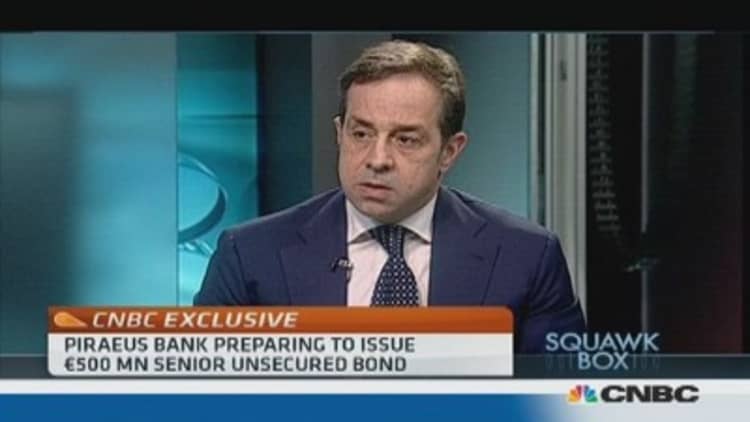Euro zone finance ministers on Monday urged Greece to conclude talks with its international lenders on the latest review of the country's bailout program as early as this week.
The review by the Troika – the European Commission, ECB and IMF – started in September and has been the longest running since the country took its first bailout in 2010. It checks the country's compliance with reforms and austerity demanded in return for aid.
Greece's finance minister, Yannis Stournaras, was hoping for an agreement by Monday's meeting. The finance ministers acknowledged the progress made since the Troika returned two weeks ago, but there still seem to be disagreements on a number of issues.
(Read more: Piraeus CEO: Greek banks will be Europe's best)
"There are a number of issues still to deal with on the fiscal side, on the banking side and on the reform side.", said Eurogroup President Jeroen Dijsselbloem during a press conference in Brussels.
Greek funding needs aren't as pressing these days as they used to be, but a May deadline nonetheless looms. Two bonds worth a combined 10.2 billion euros are set to mature May 20 and 22. The next tranche of aid from the Troika should be enough to cover this, but the funds need to be released on time.
Greece is still set to receive a 4.9 billion euro loan tranche from the EU and 1.9 billion euros from the IMF. Klaus Regling, who heads the euro zone bailout fund or EFSF, said on Monday that the fund still has 10.1 billion euros in the pipeline for Greece under the current program.
"In Greece, the (Troika) mission is still in the country, so the size and the time of the next disbursement from the EFSF to Greece will depend on the outcome of this mission.", he told reporters after Monday's meeting of finance ministers.
The Bank of Greece and the Troika disagreed last week over the recapitalization needs of Greek banks. Greece puts the figure at 6.4 billion euros ($8.9 billion), while the IMF says it is around 8-9 billion euros.
"We took note of the results of the supervisory stress test in Greece and the asset quality review of the six Greek banks and the ensuing estimates for the banks' recapitalization needs. Now we expect that the necessary capital is injected swiftly into all the banks and is raised first and foremost from private investors and we welcome that two banks have announced recapitalization plans going beyond the requirements stemming from the test," Dijsselbloem said.
(Read more: Greek bank selling bonds: Would you buy?)
Alpha Bank and Piraeus Bank announced last week their return to capital markets.
According to Kathimerini newspaper, which cited government sources, Greece is under pressure from the Troika to submit a new legal framework that would allow the Greek recapitalization fund to sell shares it acquired from Greek lenders at a lower price. Such a law would be hard to pass through parliament.
Other sticking points seem to be mass layoffs in the public sector and the implementation of the OECD's recommendations to remove regulations that hamper competition, the so-called OECD 'toolkit'.

These are not compulsory, but the Troika wants "as many as possible implemented", according to Commission sources. "We understand there may be some exceptions, but they have to be very well justified", they say.
The Greek government, meanwhile, is trying to hold out on some points. "The issues remain basically the same and especially the economic reforms are essential in order to conclude the review mission.", European Commissioner for economic and monetary affairs and the euro, Olli Rehn, said during a press conference in Brussels.
(Read more: Why bottom-fishing hedge funds may soon turn away from Greek banks)
It is a tough balancing game for the Greek coalition that needs to refrain from deeply angering its electorate, with European parliamentary elections looming in May. The vote is regarded as one of the biggest political risks Greece faces this year. Left-wing opposition leader Alexis Tsipras has said he will seek early elections at home, if the European result is highly favorable to his party, SYRIZA.
The fiscal gap for 2014 is not an issue in the review talks any more, as the Troika seems to be convinced that Greece will be achieving a primary surplus, which would be enough to fund its needs.
The Troika is now discussing with Greece its fiscal plans for 2015, according to European Commission sources. "It looks as if the outcome for last year will be better than expected. We are of course still waiting for the last Eurostat data that will come out in April, but the picture is quite positive. Greece now has to send a strong signal of its commitment to reforms," the same source told CNBC.
(Read more: Europe banks get downgrade warning amid 'bail-in' concerns)
The Greek government has signed two bailout agreements worth 240 billion euros in loans. Greece has received around 220 billion euros in aid since 2010. The rest is still to be released on condition that the Greek government is implementing the reforms required by lenders.
Troika chiefs are expected to return to Athens later this week.
Follow us on Twitter: @CNBCWorld

